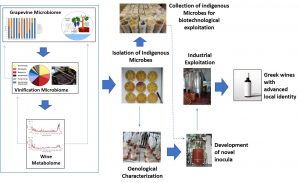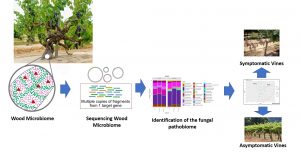Microbes inhabiting plants exhibit different life-styles ranging from pathogenic to beneficial. Several recent studies have highlighted the enormous diversity of the microorganisms inhabiting plant parts and identified the significant role of epiphytic, endophytic and rhizospheric microbes on plants well-being all together with the plant constituting the plant holobiont.
One of the focus of our work is to identify the microbiome of significant crops for the Greek agriculture like olive trees and vines targeting selected emblematic indigenous varieties. Regarding olive trees we hypothesize that plant genotype (cv. Koroneiki and Chalkidikis), biogeography and season are the key determinants of the plant microbiome. The relative contribution of these factors in structuring the olive trees microbiome (rhizosphere, roots, phyllosphere, carposphere) is investigated using amplicon sequencing and relevant bioinformatic approaches using our in house pipeline and server. In the same context we are investigating the role of microbial terroir in the production of high-quality wine from local vine varieties. We study the rhizospheric, epiphytic and carposheric microbiome of selected Greek varieties (cv. Vidiano, Agiorgitiko, Roditis, Sideritis) collected from different regions in Greece representing different terroirs using amplicon sequencing approaches. We further employ meta-genomic and –transcriptomic analysis in the vinification process to identify microbes from the indigenous microbiota of the grapes that drive the vinification process. This omic-driven approach will lead to the targeted isolation of these important indigenous microorganisms aiming to the development of novel fermentation processes based on the endemic microbiota for the production of high-quality wines.

Our microbiome-driven strategy for the isolation of indigenous microorganisms with desirable oenological characteristics to be exploited by the local vinification industry.
An extra focus of our work was to determine using amplicon sequencing based approaches the role of microbiome in the development of Grapevine Trunk Diseases, which devastate vineyards globally, the diversity of the fungal pathobiome and its interactions with the wood bacteriome.

Using wood microbiome as a tool to determine and predict GTDs
A second focus of our work is to study the interactions of the phyllospheric microbial community with abiotic stress conditions. Phyllosphere constitutes a harsh environment for microbes. Recent studies showed that the epiphytic bacterial and fungal community are quite diverse and carry significant functional traits like nitrogen fixation, methanol utilization and degradation of organic pollutants. The phyllosphere of cultivated plants is exposed regularly to pesticides. However little is known about the response of epiphytic microorganisms on this regular pesticide exposure. Our hypothesis is that pesticide exposure would lead to changes in the epiphytic microbial community which could appear as toxicity or as acclimation towards enhanced biodegradation of the sprayed pesticides. These interactions are explored via classic microbiological methods and amplicon sequencing analysis. Isolated epiphytes with the capacity to degrade pesticides have been isolated and their genomic context is currently determined using hybrid sequencing approaches and transcriptomics.
Publications
- Karamanoli E., Thallasinos G., Karpouzas D.G., Bozapalidis A., Vokou D., Isis-Konstantinidou, E (2012) Are leaf glandular trichomes of oregano hospitable habitats for bacterial growth? Journal of Chemical Ecology 38(5): 476-485
- Moulas C., Petsoulas C., Rousidou C., Perruchon C., Karras P., Karpouzas D.G., (2013) The effects of systemic pesticides imidachloprid and metalaxyl on the phyllosphere of pepper plants. BIOMED Research International Volume 2013 Article ID 969750, 8 pageshttp://dx.doi.org/10.1155/2013/969750
- Katsoula A., Vasileiadis S., Sapountzi M., Karpouzas D.G., (2020) The response of soil and phyllosphere microbial communities to repeated application of the fungicide iprodione: Accelerated biodegradation or toxicity? FEMS Microbiology Ecology fiaa056, https://doi.org/10.1093/femsec/fiaa056
- Katsoula A., Vasileiadis S., Karamanoli K., Vokou D., Karpouzas D.G. (2021) Factors structuring the epiphytic archaeal and fungal community in a semi-arid Mediterranean ecosystem Microbial Ecology https://doi.org/10.1007/s00248-021-01712-z
- Kakagianni M., Tsiknia M., Feka M., Vasileiadis S., Leontidou C., Kavroulakis N., Karamanoli A., Ehaliotis C., Karpouzas D.G., Papadopoulou KK. (2021) Above- and below-ground microbiome in the annual developmental cycle of the olive tree, submitted
- Bekris F., Papadopoulou E., Testembasis S., Karaoglanidis G., Paplomatas E., Tzima A., Markakis E., Vasileiaidis S., Karpouzas D.G., (2021) Wood microbiome analysis reveals key microbial players and the role of vine genotype in grapevine trunk diseases, submitted
Funding
 EXCELLENCE II, Essential-oil mediated plant-microbe interactions in the Mediterranean environment: in search of a role and novel applications (ESEPIMENT), Funding Body, General Secretariat of Research and Technology, Greece, Duration 2014-2015, Coordinator UTH: Dimitrios Karpouzas
EXCELLENCE II, Essential-oil mediated plant-microbe interactions in the Mediterranean environment: in search of a role and novel applications (ESEPIMENT), Funding Body, General Secretariat of Research and Technology, Greece, Duration 2014-2015, Coordinator UTH: Dimitrios Karpouzas
![]() Emblematic Action Routes of Olives, Funding Body: Ministry of Education, Greece. Duration: 2018-2020, Coordinator UTH: Kalliope Papadopoulou
Emblematic Action Routes of Olives, Funding Body: Ministry of Education, Greece. Duration: 2018-2020, Coordinator UTH: Kalliope Papadopoulou
![]() Emblematic Action Routes of Vineyards, Funding Body: Ministry of Education, Greece. Duration: 2019-2021, Coordinator UTH: Dimitrios Karpouzas
Emblematic Action Routes of Vineyards, Funding Body: Ministry of Education, Greece. Duration: 2019-2021, Coordinator UTH: Dimitrios Karpouzas
 Support of Research, Development and Innovation Projects in the Priority Sector of RIS3 – AgroFood, Region of Western Greece, Microbe Terroir – The role of microbial terroir in the production of high quality wine from local vine varieties. Duration 2019-2021, Coordinator UTH: Dimitrios Karpouzas
Support of Research, Development and Innovation Projects in the Priority Sector of RIS3 – AgroFood, Region of Western Greece, Microbe Terroir – The role of microbial terroir in the production of high quality wine from local vine varieties. Duration 2019-2021, Coordinator UTH: Dimitrios Karpouzas
 Call RESEARCH-CREATE-INNOVATE, Valorization of Drama wine identity through a holistic characterization of the natural and microbial environment (DRAMA-TERROIR). Funding body: EYDE-ETAK, Duration 2021-2024, Funding: 145000 €.
Call RESEARCH-CREATE-INNOVATE, Valorization of Drama wine identity through a holistic characterization of the natural and microbial environment (DRAMA-TERROIR). Funding body: EYDE-ETAK, Duration 2021-2024, Funding: 145000 €.
 State Scholarship Foundation of Greece, Call PhD students fellowships, Study of the function and diversity of the microbial community in plant phyllosphere and interactions with adjacent environmental compartments. Duration: 2018-2020, Coordinator: Dimitrios Karpouzas, Benefited Student: A. Katsoula
State Scholarship Foundation of Greece, Call PhD students fellowships, Study of the function and diversity of the microbial community in plant phyllosphere and interactions with adjacent environmental compartments. Duration: 2018-2020, Coordinator: Dimitrios Karpouzas, Benefited Student: A. Katsoula
Personnel
Dr Fotis Bekris, Postdoc fellow
Dr Nancy Katsoula, Postdoc Fellow
Maria Feka, PhD student
Elena Papadopoulou, PhD student